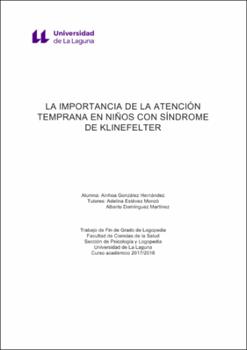La importancia de la Atención Temprana en niños con Síndrome de Klinefelter
Fecha
2018Resumen
El síndrome de Klinefelter o 47 XXY se produce por una mutación cromosómica que da lugar a una trisomía de los cromosomas sexuales. Esto crea un cuadro clínico característico en las personas que lo padecen,
produciendo alteraciones tanto a nivel físico, como afectivo y lingüístico. La sintomatología de este síndrome hace necesario un diagnóstico temprano durante la infancia, de manera que se pueda intervenir lo antes posible para tratar de paliar las alteraciones producidas. Por esta razón, se considera que lo
más adecuado sería una intervención en Atención Temprana, donde se abordasen las dificultades del niño en su globalidad desde un equipo multidisciplinar. Esta revisión bibliográfica se centrará en valorar las
afectaciones lingüísticas de los niños con síndrome de Klinefelter y su intervención logopédica, con el fin de conseguir un desarrollo óptimo de las habilidades y capacidades del niño. Klinefelter syndrome or 47 XXY is produced by a chromosomal mutation that results in a trisomy of the sex chromosomes. This creates a characteristic clinical picture in people who suffer from it, producing alterations on a physical, emotional and linguistic level. The symptoms of this syndrome require an early
diagnosis during childhood, so that you can intervene as soon as possible to try to alleviate the changes produced. Therefore, it should be considered that an intervention in Early Intervention would be the most appropriate, where the difficulties of the child as a whole would be addressed by a multidisciplinary
team. This bibliographic review will generally focus on the linguistic affectations of children with Klinefelter Syndrome and on the logopedic intervention in Early Intervention in order to achieve an optimal development of the child's abilities and strengths.





